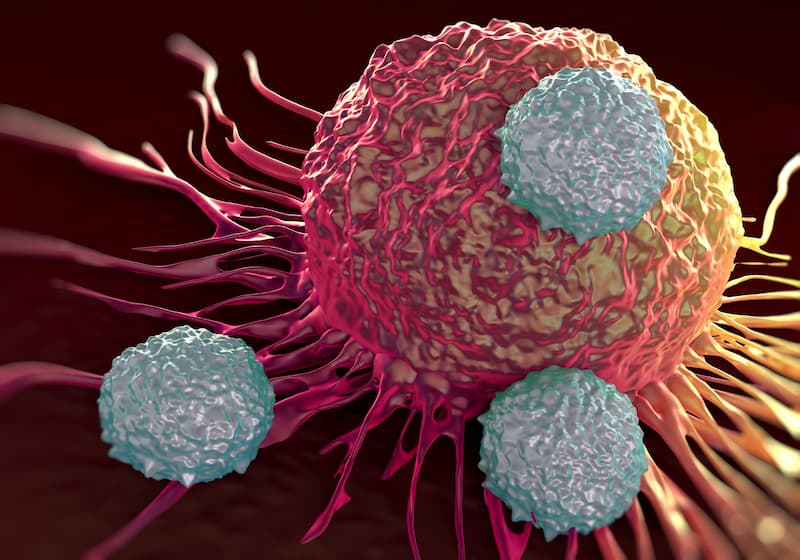Perioperative Therapy Plus ICIs Increases High-Grade TRAEs in Cancer
Data from a meta-analysis may provide safety insights for future randomized clinical trials evaluating immune checkpoint blockade in the definitive setting for patients with cancer.
Incorporating a multi-disciplinary approach where oncologists closely monitor patients for [TRAEs], approaches that facilitate timely interventions with the help of subspecialists, coupled with proper patient education, are needed to avoid treatment discontinuation in patients with potentially curable cancer," according to the study authors.

Adding immune checkpoint inhibitors to standard perioperative therapy correlated with a significant increase in the rate of grade 3/4 treatment-related adverse effects (TRAEs) in the treatment of patients with cancer, according to findings from a meta-analysis published in Lancet Oncology.
Administering immune checkpoint blockade with conventional neoadjuvant or adjuvant treatment resulted in a significant increase of grade 3/4 TRAEs (OR, 2.73; 95% CI, 1.98-.3.76; P <.0001), which typically included colitis, rash, transaminitis, and hypophysitis. Findings from a subgroup analysis highlighted that this increase in high-grade toxicity was consistent whether patients were treated with CTLA-4, PD-1, or PD-L1 inhibitors.
The use of immune checkpoint blockade conferred a significantly higher likelihood of any-grade TRAEs (OR, 2.60; 95% CI, 1.88-3.61; P <.0001), serious AEs (SAEs; OR, 1.96; 95% CI, 1.58-2.44; P <.0001), and toxicity resulting in treatment discontinuation (OR, 3.67; 95% CI, 2.45-5.51; P <.0001). Additionally, treatment with PD-1, PD-L1, and CTLA-4 inhibitors all correlated with increases in any-grade TRAEs and toxicity leading to treatment discontinuation.
“This work provides safety insight for further [randomized clinical trials] assessing immune checkpoint blockade in the definitive setting,” the study authors wrote. “Incorporating a multi-disciplinary approach where oncologists closely monitor patients for [TRAEs], approaches that facilitate timely interventions with the help of subspecialists, coupled with proper patient education, are needed to avoid treatment discontinuation in patients with potentially curable cancer.”
The study authors used databases including PubMed/MEDLINE, Embase, Web of Science, and the Cochrane Library to evaluate findings from randomized phase 2 or 3 clinical trials that investigated the effects of combining immune checkpoint blockade with neoadjuvant or adjuvant therapy for cancer. Specifically, the meta-analysis focused on trials that evaluated treatment-related deaths and included experimental groups in which patients received immune checkpoint blockade in addition to the therapy being administered in the control group.
End points of interest in the meta-analysis included the effect of immune checkpoint blockade on death, grade 3/4 TRAEs, any-grade TRAEs, SAEs, and toxicity leading to treatment discontinuation, all of which were calculated using ORs. Investigators conducted this meta-analysis using the Mantel-Haenszel method.
The meta-analysis included 16,976 patients enrolled across 28 randomized clinical trials. Of these trials, 19 were phase 3 studies, and 9 were phase 2 investigations. Additionally, 7 trials evaluated the addition of CTLA-4 blockade, 10 assessed the addition of PD-1 inhibitors, and 11 investigated the addition of PD-L1 blockade.
Investigators reported that combining immune checkpoint blockade with standard neoadjuvant or adjuvant therapy did not a confer a significantly higher risk of treatment-related deaths (OR, 1.76; 95% CI, 0.95-3.25; P = .073). Moreover, it was highlighted that the immune checkpoint blockade vs placebo trial design correlated with an increased rate of treatment-related deaths compared with other study designs. Overall, 9864 patients experienced 40 TRAEs resulting in death, with the most common fatal toxicities including pneumonitis (15.0%), myocarditis (12.5%), and colitis (7.5%) among patients who were treated with immune checkpoint blockade.
According to the investigators, there was no apparent publication bias for each treatment outcome based on assessments using funnel plots and Egger’s test (P <.05). Moreover, 11 randomized clinical trials appeared to have a high risk of masking patients and personnel based on lack of blinding from their open-label trial designs.
Reference
Fujiwara Y, Horita N, Adib E, et al. Treatment-related adverse events, including fatal toxicities, in patients with solid tumours receiving neoadjuvant and adjuvant immune checkpoint blockade: a systematic review and meta-analysis of randomised controlled trials. Lancet Oncol. Published online November 24, 2023. doi:10.1016/S1470-2045(23)00524-7
How Supportive Care Methods Can Improve Oncology Outcomes
Experts discussed supportive care and why it should be integrated into standard oncology care.